What kind of water for a humidifier?
Investing in the right humidifier to have control over the humidity level of the space is a wise decision. However, it does not stop with just buying humidifiers, it is important to maintain the humidifier regularly and follow the instructions. A good majority of customers are unaware of the importance of using the right kind of water in a humidifier. The humidifier’s tank is a sensitive unit and therefore it is crucial to use the right water in a humidifier to keep the humidifier clean to maintain healthy indoor air quality.
In this article, we will discuss in detail what kind of water for humidifier must be used and which is the right choice, and why it is important to use the best water in a humidifier to keep away impurities in the humidifier’s tank and as well as air contamination. Let us get started!
What Type of Water is Best to Use in a Humidifier?
When you add water to your humidifier you must exercise caution. Whether you use a warm mist humidifier or a cool mist humidifier, using the best kind of water for a humidifier is essential. The best type of water to add to your unit is humidifier distilled water.
Distilled water in a humidifier is the ideal choice because it has been carefully treated to remove minerals, bacteria, and all other types of contaminants that are detrimental to your humidifier. The process by which distilled water or demineralized water is made ensures that it is free from different minerals.
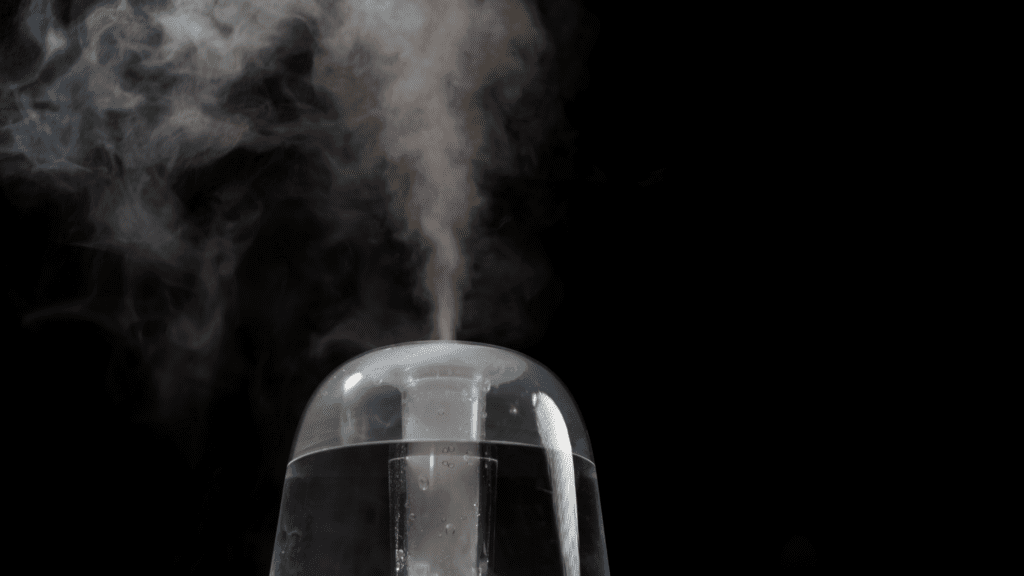
To make distilled water, the process starts with boiling water. When the boiled water evaporates and the steam is left behind, you can notice the mineral content in the boiled water as well. Dissolved minerals and other contaminants are left behind as residue when the steam condenses. The steam that condenses cools down and is collected again. This condensate collected is distilled water.
The reasons why you must use only distilled water in a humidifier:
Humidifier distilled water keeps the humidifier clean
Distilled water is purified water. Since all the impurities are removed there are very less chances that your humidifier will develop mold growth, bacterial growth, or struggle with mineral build-up as a result of this purified water.
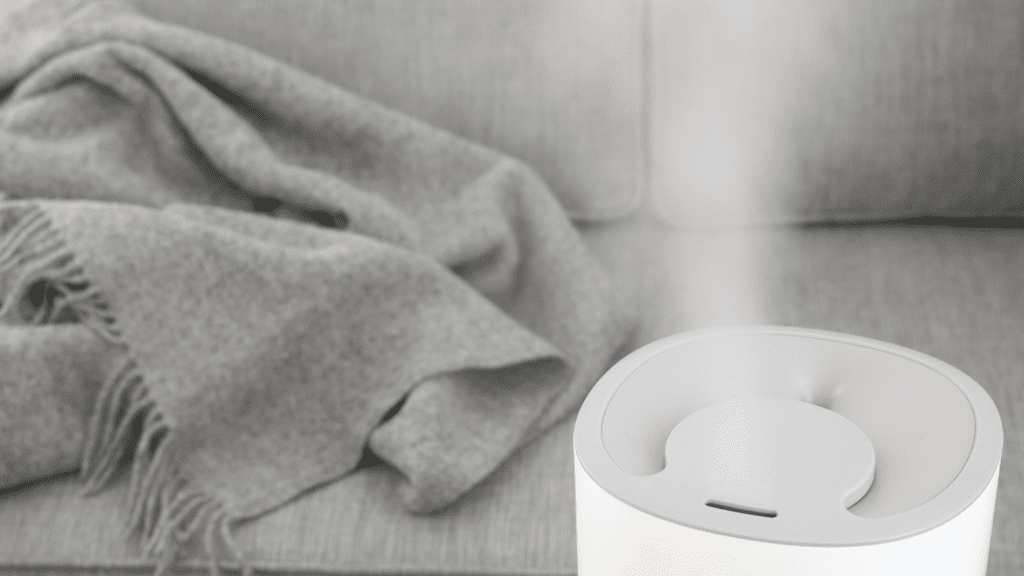
With the dissolved minerals and other mineral content being removed, you can be assured that there are very less chances to find mineral deposits or mineral build-up in the reservoir and the air inside your home. Calcium, sodium, and magnesium are the common mineral content found in hard tap water. When you remove minerals like calcium, sodium, and magnesium, you can prevent scale build-up in the reservoir.
Distilled water in a humidifier prevents bacterial growth and mold growth
The process of boiling water and then condensing the steam will kill bacteria and other microorganisms. To prevent unwanted bacteria, the generation of mold spores, pink mold build-up, etc. from taking root in the reservoir. Since distilled water is free from mold spores and unwanted bacteria, it is the best water for a humidifier which will no longer be the perfect habitat for them.
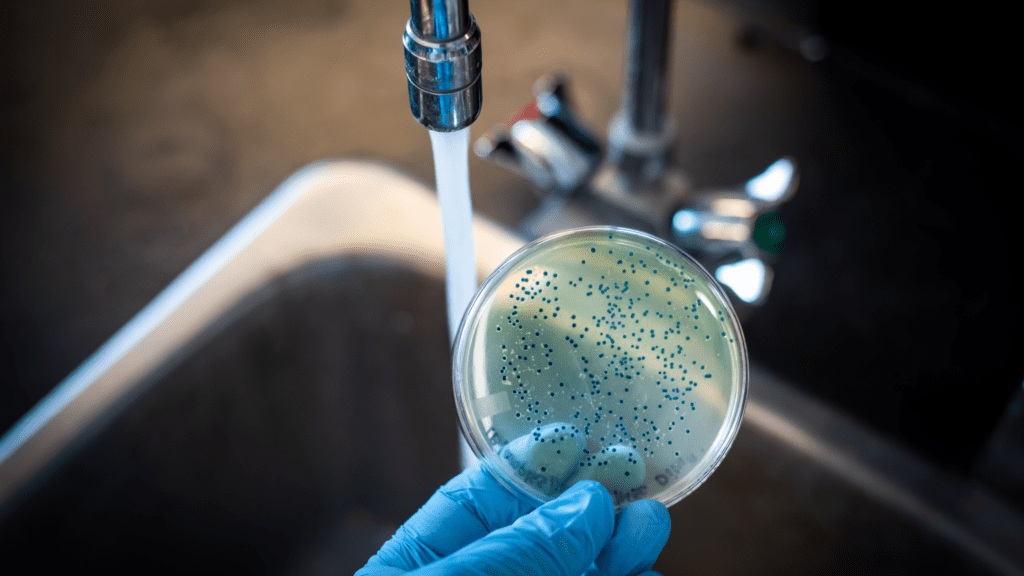
Distilled water in a humidifier ensures your home is free from air contamination
A common air contaminant that comes from using hard water in a humidifier is white dust. This white powder or white dust is a result of the dissolved minerals present in the hard tap water in your humidifier. Since you remove impurities and remove mineral deposits during the demineralization process while making distilled water, there is no chance of the dissolved minerals forming white powder or mineral build-up. This is the reason it has been advised to use only distilled water in your humidifier.

Demineralized water is a must to prevent the dissolved minerals in regular tap water or hard water from leading to white powder contaminants in the indoor air. Poor indoor air quality leads to lung infections and humidifier fever. Inhaling the mineral deposits from the white powder that is dispersed into the air inside your home will cause humidifier fever and other infections.
What happens if you use tap water for your humidifier?
Regular tap water is the wrong kind of water that damages the internal parts of the humidifier and also reduces the air quality. Tap water contains different minerals and heavy metals. The dissolved minerals and heavy metals like calcium and magnesium in the tap water lead to mineral deposits in the reservoir by causing scale build-up. When the reservoir and internal parts of the humidifiers are found to have scale build-up in them is the perfect habitat for bacterial growth and mold growth or pink mold.
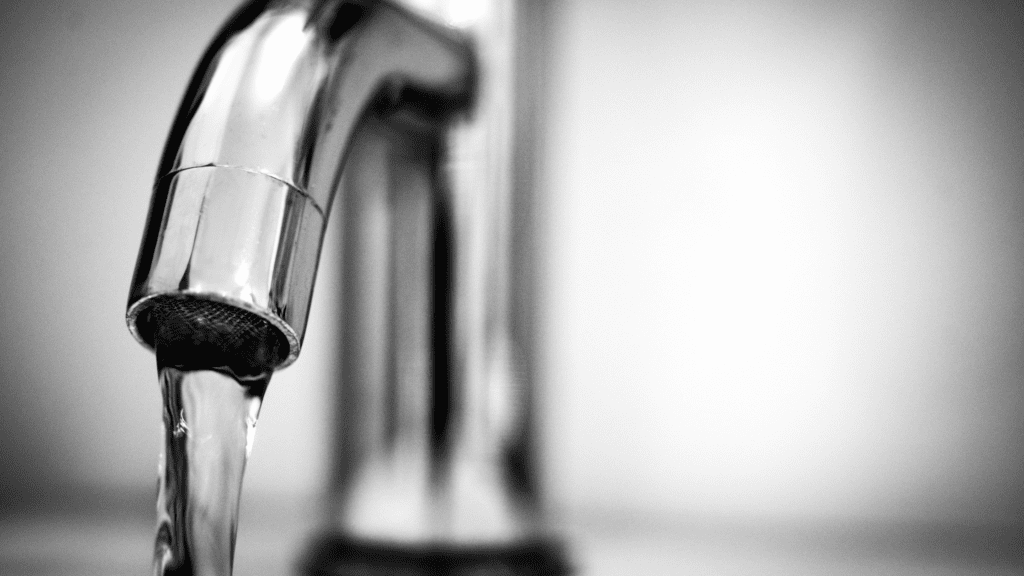
White powder formation, scale build-up, bacterial growth, mold spores, and mold build-up, are the various problems that arise from using tap water in your humidifiers. The short answer is it is crucial to keep the humidifier clean to avoid health problems.
What if you don’t have distilled water for my humidifier?
In cases where you do not have purified water or distilled water available, you can make use of a demineralization cartridge before you add tap water to your humidifier to remove impurities and to remove minerals, and heavy metals like calcium and magnesium. The short answer is to avoid heavy metals and the wrong kind of water in a humidifier. These are working altogether against the wellness of indoor air and your unit.
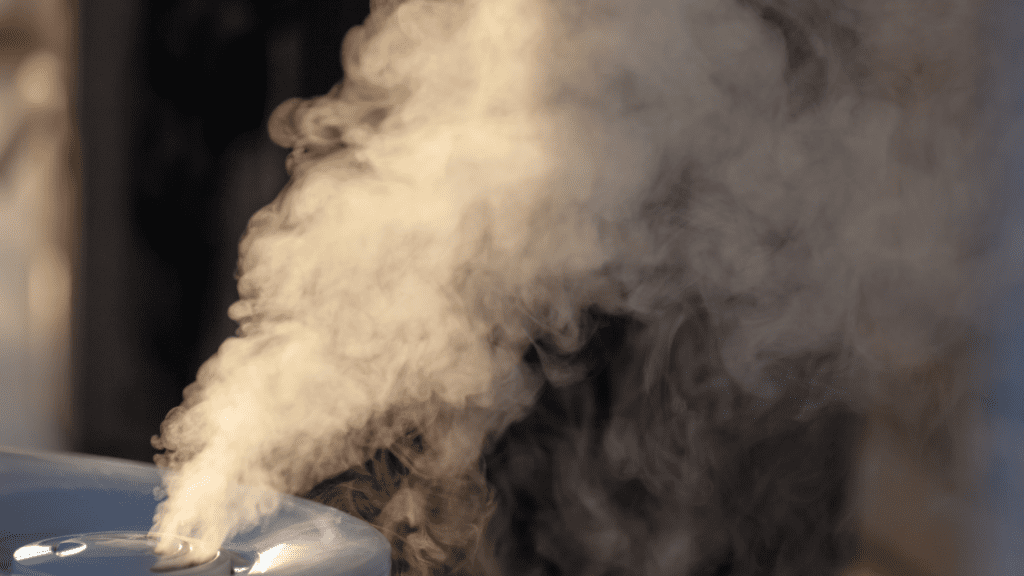
Bottled water in your humidifier is also not the ideal choice. Although it is purified water that goes through a process it can still contain minerals that can cause health problems when inhaled.
Do humidifiers need hot or cold water?
One must remember that hot or cold water in your humidifier is not a replacement for distilled water. Although hot water or boiling water kills bacteria and neutralizes mold, and certainly reduces the chances of causing scale build-up, boiled water is still filled with dissolved minerals and can lead to mineral deposits. It is not recommended to add direct boiling water or hot water to the unit. You must wait until the boiled water is cooled down to room temperature.
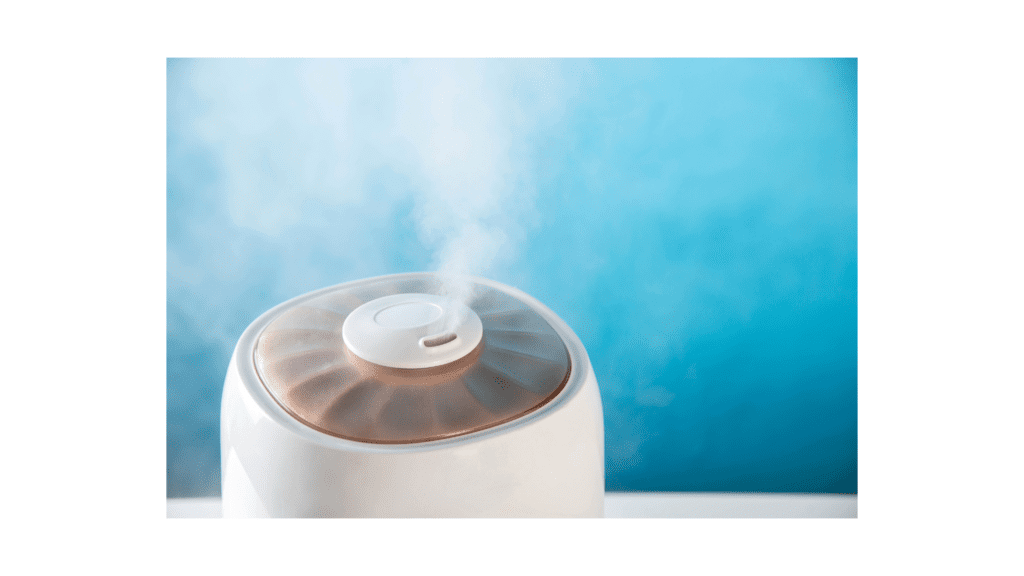
Similarly, very cold water in your humidifier is also not good. Cold water in a humidifier is going to increase the work function of the humidifier and exert a strain on the unit.
Do you know why your humidifier needs to be properly maintained?
Are you maintaining your humidifier properly?
Consistent and thorough cleaning of humidifiers is crucial. Whether you use a warm mist humidifier or cool mist unit, you must clean the reservoir, water filters, and air filters thoroughly.
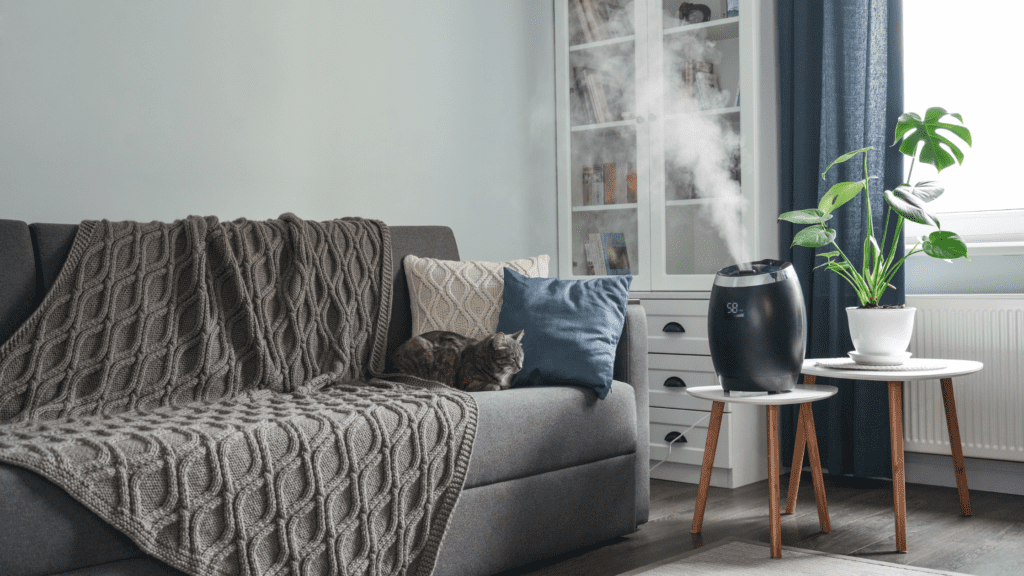
The alternating warm steam or cool air temperature that the humidifier deals with gives the perfect moisture required for mold and bacteria to thrive. You must clean washable parts, the water filters, and the air filters as and when required. Any negligence in cleaning humidifiers can lead to serious health problems.
How long can you keep the same water in a humidifier?
The length of time that water in your humidifier can be left unchanged will depend on the unit. While some humidifiers assure continuous humidification for a few days with just one-time filling, some humidifiers allow humidification for a few hours. Following the instructions specific to the model on how long the water in a humidifier is highly recommended.
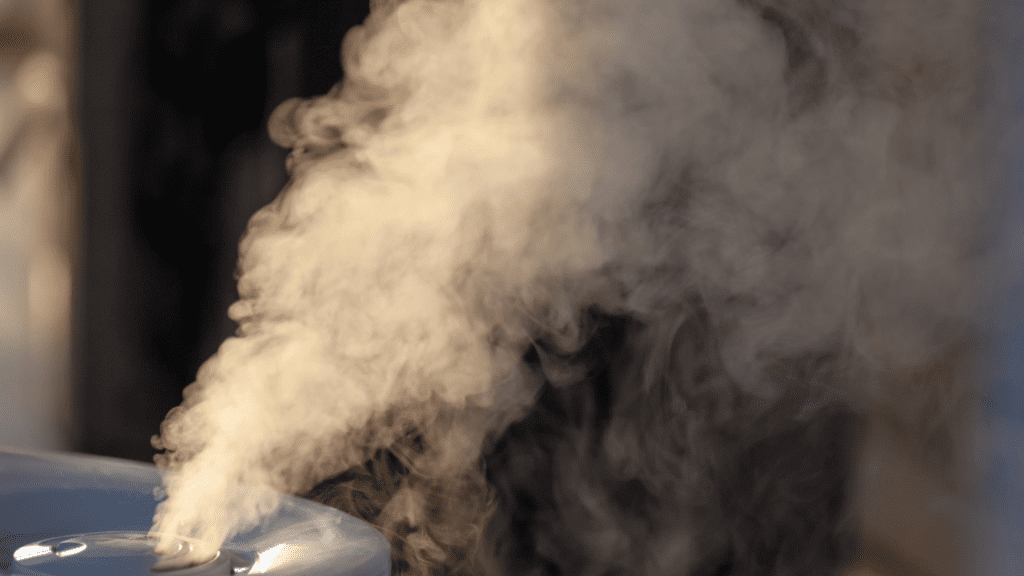
However, if you are not using the humidifier experts advise you must discard the water. Skipping a day and reusing the water will lead to the spreading of mold and bacteria.
FAQ Section
1. Is it better to have a humidifier with a filter or without?
Humidifiers with water filters and air filters are excellent to trap bacteria and other contaminants. Dissolved minerals and other contaminants of air and water can be successfully removed with models that have filters installed in them.
2. Can you use bottled water in humidifier?
As aforementioned, bottled water does come across as pure water. Drinking water or bottled water is purified by a process to get rid of impurities. However, this pure water is not purified from dissolved minerals. The process of getting pure bottled water is different from distillation.
Subjecting water to purification and heat to make it potable is not the same as removing minerals via distillation. It is hence suggested to avoid using bottled water in your humidifier.
3. Is boiling water the same as distilled water?
No. Boiled water is not the same as distilled water. Boiling water at a high temperature kills microorganisms like bacteria, mold, and viruses. Boiled water does not remove minerals from the water. On the contrary, mineral deposition increases when you boil water.
4. Can you make distilled water at home?
The process of distilling water can be attempted at home using a water distiller. Boiling water to the temperature at which it turns to water vapor, and then collecting the condensed water vapor is distillation.
The condensed water vapor will be pure and free from minerals and other contaminants.
Wrapping Up
That’s a wrap to the article. We trust the article cleared your doubts on which water in a humidifier is the best choice for one’s health and air. Share with us your experiences with using tap water in a humidifier or distilled water in a humidifier. Let us know in the comments below the dos and don’ts when it comes to using tap water and distilled water for different types of humidifier units.

About The Author
Olivia — a self-confessed air quality addict — is a home climate enthusiast, fresh air advocate, and someone with deep personal experience and knowledge about mold extermination. Her work was mentioned in countless notable humidity publications. Previously she was an editor at Mold Remediation.